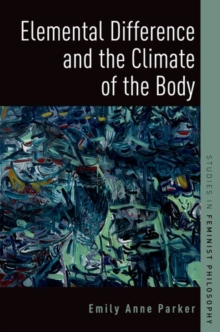Description
| Product ID: | 9780197575079 |
| Product Form: | Hardback |
| Country of Manufacture: | US |
| Series: | Studies in Feminist Philosophy |
| Title: | Elemental Difference and the Climate of the Body |
| Authors: | Author: Emily Anne Parker |
| Page Count: | 322 |
| Subjects: | Social and political philosophy, Social & political philosophy, Feminism and feminist theory, Environmentalist thought and ideology, Climate change, Feminism & feminist theory, Environmentalist thought & ideology, Climate change |
| Description: | Select Guide Rating Political hierarchies and ecological crises are often considered to be two different problems. For example, many speak in the present of parallel concerns: climate change and racial injustice. Emily Anne Parker argues rather that these concerns share a common cause in the polis. Polis is an ancient Greek term for the city-state, from which the English term political derives. But polis is more than a term. It is a philosophy according to which there is one complete human body, and that body is meant to govern all other things. In that sense there are not two concerns, but instead one concern: to perceive the ways in which this tradition of the polis constrains the present. Emily Anne Parker bridges the insights of social constructionism and new materialisms to create a philosophy of elemental difference. Difference, rather than needing to be either dismissed based on its social construction or reified in keeping with the hierarchies of the polis, is crucial for addressing contemporary crises of the polis. In nineteenth-century Europe, differences among human bodies were understood to be matters of scientific classification. At the height of scientific acceptance, it was unthinkable that race or sex or diagnosis or indigence were invention. Today, however, differences among human bodies are understood as matters of social construction. The philosophy of social construction understands differences among humans to be matters of human imposition. Social constructionism''s way of understanding the origin of differences among humans is so well-established as to have no currently viable alternatives, even among new materialists, social constructionism''s most ardent critics. This book argues that new materialists and social constructionists share a distinction between the political and the ecological. Emily Anne Parker centers her argument on the philosophical concept of the polis, according to which there is one complete human form. It is this form that is to blame for our current political and ecological crisis. Political hierarchies and ecological crises are often considered to be two different problems: for example, many speak of parallel problems, climate change and racial injustice. Parker argues that these are not parallel crises so much as one problem: the polis. The philosophy of the polis asserts that there is one complete human body, and that body is meant to govern all other things. In that sense there are not two crises, but instead one concern: to perceive the ways in which this tradition of the polis constrains the present. Elemental difference in the polis is appreciated in the fact that "empirical bodily non-identity," an Aristotelian concept, can be called upon to elevate one group of bodies among the rest. Parker builds from Sylvia Wynter, who argues that the very idea of empirical bodily non-identity begins with the modern science of racial anatomy, or what Wynter calls biocentrism. Parker argues that biocentrism is a feature of the polis, according to which the one complete body was defined by its capacity for disembodied thought. The sciences of racial anatomy are a more explicit commitment to biocentrism, but the ranking of matter with respect to one complete human, a body that is the site of supra-natural thinking, is a practice that has always characterized the polis. In this way, the polis is responsible for both political and ecological hierarchy. It is as responsible for what is euphemistically called climate change as it is for the political hierarchy that constitutes it.Elemental Difference and the Climate of the Body ultimately bridges the insights of social constructionism and new materialisms to create a philosophy of elemental difference. Difference, rather than needing to be either dismissed based on its social construction or reified in keeping with the hierarchies of the polis, is crucial for addressing contemporary crises of the polis. |
| Imprint Name: | Oxford University Press Inc |
| Publisher Name: | Oxford University Press Inc |
| Country of Publication: | GB |
| Publishing Date: | 2021-10-12 |


